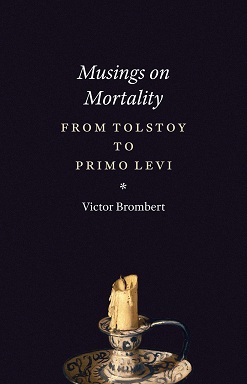Victor Brombert’s Musings on Mortality
Victor Brombert is the Henry Putnam University Professor Emeritus of Romance and Comparative Literatures at Princeton University. He is also an escapee of German-occupied France and a veteran of the Second World War; a scholar of comparative narrative studies and the history of ideas; the author of more than a dozen books; former president of the Modern Language Association and of the Association of Literary Studies; a Fulbright Fellow, a National Endowment for the Humanities Senior Fellow, a two-time Guggenheim Fellow, a Chevalier de la Légion d’Honneur, and is Commandeur des Palmes Académiques.
Death is a theme that has preoccupied Brombert at least as long as his youth: first, as the opening pages of his latest book Musings on Mortality alerts us, following the death of his pet canary, and later in the wake of his experiences during World War II. The liner notes read something like, death can be found all around us, but the literature we produce is on the side of life. In the book, Brombert takes on Coetzee, Bassani, Camus, Kafka, Woolf, Thomas Mann, and Primo Levi, among others, in order to ground the works of these writers in the philosophical complaints of the human condition, most notably their meditations on mortality.
From a recent review in the Times Higher Education:
Brombert begins with his childhood and the death of a beloved canary and quickly proceeds, along a widening autobiographical trajectory, to the death of his sister Nora and the deaths of his parents, to war, to the death camp in Auschwitz, to the visceral fear he experienced as a soldier at Omaha Beach. Beloved things become alien and feared, whether it is the one enlarged pore he notices on his dead father’s face or the “trains I so loved in my childhood, and continue to love in their remembered glory” which enter into “sinister associations” with wartime Europe. He begins, under the influence of André Malraux, to understand that in the face of encroaching death it is “art and the love of art” that allow us “to negate our nothingness.” Towards the end of the book he argues convincingly that “literature commemorates what death has undone.”
An excerpt from Musings on Mortality: From Tolstoy to Primo Levi:
Does Tolstoy, in his late years, load the dice for the sake of teaching a moral lesson? Does he leave room for any ambivalence, for any genuine irony? Edward Wasiolek reported years ago that his students, fed on Henry James’s belief that reality had myriad forms, used to complain that Tolstoy’s famous novella The Death of Ivan Ilych was arbitrary, preachy, painfully lacking in ambiguity and “levels of meaning.”
The Death of Ivan Ilych (1886) is in fact deceptively simple. Written years after War and Peace and Anna Karenina, this powerful narrative about dying and death is remarkable for its brevity, its succinctness, its ordinariness. The narrator himself comments on this apparent banality at the beginning of the story: “Ivan Ilych’s life had been most simple and most ordinary, and therefore most terrible.” The tragic dimension of this work is thus from the outset attributed to a very common life experience. The title itself provides obvious signals: “Ivan Ilych.” It is hard to imagine a more remarkable first name and patronymic. It is like calling the protagonist John Smith or Everyman. And nothing could be more common or widespread than death, the first substantive of the title, a word that in Russian comes bluntly without a definite article, a reminder of a stark and generalized human condition, so generalized indeed as to exclude uniqueness.
All of us, Tolstoy might say, cherish the illusion that we are unique. Ivan Ilych recalls that in school he had learned from a textbook the syllogistic formula “Caius is a man, men are mortal, therefore Caius is mortal.” But what logically applied to Caius and to all the Caiuses of this world did not apply to him. He was special, after all—or so he had felt until now. He was not Caius; he was Ivan, or Vanya, as his mother used to cal him, and a very special Vanya at that. But, now that his body is failing and the terror of death has become a daily reality, he can no longer avoid staring into the face of a common destiny. In this new awareness of common law, a common doom, he feels more lonely than ever. As he lies on his deathbed, he hears the sounds of merriment in his household, the sounds of singing and laughter. He almost chokes with anger: “but they will die too! Fools! I first, and they later.” For they too will have to recognize the truth of the terrible law.
***
Tolstoy knew that fear and trembling remain supremely personal, that the discovery of death is made in utter solitude. Yet the sense of dereliction also comes with an awareness of a common destiny and a common humanity. Ivan Ilych is not a tragic figure. He is no King Lear; but in his illness, like Lear driven mad, he discovers that he too is not “ague-proof,” that the hand his courtiers used to kiss smells of mortality.
The crucial question for Tolstoy is how we face this revelation, what it tells us about the way we have lived. Ivan Ilych learns—the lesson may come too late—that emptiness, self-deception, and false values have been at the core of his life, that in the process of living we all deny the truth of our human condition, that we lie to ourselves when we pretend to forget about death, and that this lie is intimately bound up with all the other lies that vitiate our moral being. It is a denunciation of a spiritual world.
To read more about Musings on Mortality go here.
